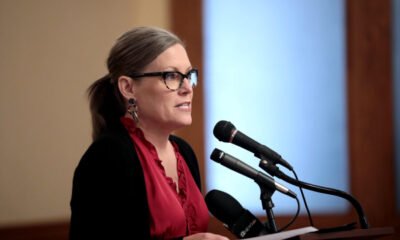abortion
Controversial Crisis Pregnancy Centers Surge Amid State Abortion Access Showdown

AZCIR is an independent, nonprofit newsroom dedicated to statewide investigative reporting. Sign up for our free newsletter to have our investigations delivered straight into your inbox.
In September 2022, Dream City Church in Phoenix hosted a gathering dubbed Freedom Night in America, led by Turning Point USA, a prominent conservative youth activist group. The event signified a new collaboration with Choices Pregnancy Center, which operates three of Arizona’s 40-plus crisis pregnancy centers (CPCs). CPCs typically provide free pregnancy tests and ultrasounds but lack comprehensive reproductive health services and medical licensing.
Turning Point founder Charlie Kirk received a warm reception from congregants, who were eager to hear him speak. “In a post-Roe America, it is on us as Christians to ensure every woman knows there are alternatives to Planned Parenthood,” Kirk stated, emphasizing the importance of supporting CPCs like Choices.
Since the overturning of Roe v. Wade, CPCs have gained prominence as alternatives for women considering abortions. However, critics have raised alarms about the deceptive practices employed by these centers. Arizona Attorney General Kris Mayes issued a consumer alert earlier this year, cautioning that CPCs often misrepresent themselves as medical facilities aimed at dissuading women from pursuing abortion options.
Despite their long history, CPCs have recently become focal points in the heated debate over reproductive rights. In Arizona, the current law imposes a strict 15-week abortion limit, a substantial change from the landscape prior to the recent rulings.
Richie Taylor, spokesperson for the Attorney General’s office, pointed out the urgency linked to the time frame within which an abortion must be performed. Delays caused by unqualified centers could have serious ramifications for women facing pregnancy decisions.
Tessa Cox from the Charlotte Lozier Institute praised CPCs for their support, claiming they provided substantial resources. In 2022, such centers reportedly delivered over $367 million in services to women at little to no cost. This assistance often comes with stipulations, such as participation in counseling or educational programs.
However, these limited services contrast sharply with those provided by licensed medical professionals who can offer comprehensive prenatal and postpartum care, crucial given rising maternal mortality rates in the U.S. Notably, Arizona has also seen disparities, particularly among Black and Native American mothers.
The number of CPCs in Arizona outnumbers licensed abortion providers, reflecting a national trend where CPCs outnumber abortion clinics three to one. Public funding for these centers has surged, driven by various states allocating considerable taxpayer resources following the overturning of Roe v. Wade. Arizona has specifically allocated $3 million for CPCs through a Family Health Pilot Program.
Activists argue that funding should be directed toward resources that genuinely invest in women’s well-being, rather than into organizations that align with anti-abortion ideologies. U.S. Rep. Ruben Gallego recently called for revisiting taxpayer funding for CPCs, asserting they often mislead women seeking reproductive care.
While some, like Cox, advocate for the work done at CPCs, critics maintain that these centers are designed to obstruct access to essential healthcare services. The American College of Obstetricians and Gynecologists has rejected aspects of the practices used by these centers, particularly the promotion of unscientific abortion reversal methods.
Dr. Jonas Swartz, an OBGYN, emphasized the risks posed by CPCs, noting that many women may inadvertently mistake them for legitimate healthcare providers. A past study revealed significant misinformation regarding CPCs and their services, indicating that misleading tactics are prevalent.
Attorney General Mayes’ alert highlighted various deceptive practices, including the design of CPCs to resemble medical clinics and misrepresenting staff qualifications. Calls for legislative actions to address these issues have not gained substantial traction.
As Arizona voters consider the Right to Abortion Initiative on the November ballot, the debate surrounding CPCs and abortion access is poised to intensify. The proposed measure aims to broaden abortion access, allowing procedures until around 24 weeks gestation.
Mayes’ office continues to encourage vigilance among those seeking assistance, urging them to differentiate between CPCs and licensed medical providers and report any misleading experiences.
This article first appeared on the Arizona Center for Investigative Reporting and is republished here under a Creative Commons license.

















